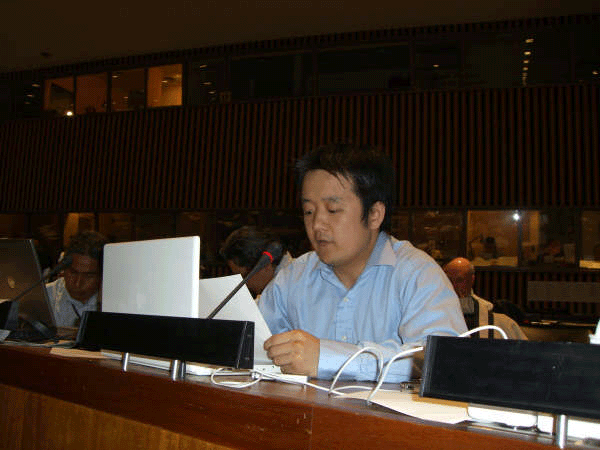| SMHRIC |
| May 21, 2007 |
| New York |
 Ladies and
Gentlemen: Ladies and
Gentlemen:
Good
morning!
My name is
Ningbat Juramt, and I represent the Southern Mongolian Human
Rights Information Center, a New York based human rights
organization dedicated to protecting and promoting all kinds of
rights of the indigenous Mongolian people in Southern Mongolia.
Thank you
Mr. Chairperson for giving me an opportunity to talk about our
concerns. On behalf of the five million indigenous Mongols
living in Southern Mongolia, our organization has been an active
participant in all six sessions of the Permanent Forum since its
very first session in 2002. We have raised our issues to the
Permanent Forum and other United Nations bodies with the hope of
improving the human rights situation in Southern Mongolia.
Unfortunately, during the past six years, nothing has improved
for the indigenous Mongolian people in Southern Mongolia. On the
contrary, conditions have worsened. Nevertheless, we still
believe this Forum provides us an opportunity not only to raise
the level of awareness of our issues to the international
community in general, but also to send our message of concern
directly to the government of China through the Chinese
government representatives sitting in this room.
Esteemed
friends, let me briefly tell you who are the Southern Mongols
and what is happening in Southern Mongolia today:
Home to
five million indigenous Mongolian people, Southern Mongolia,
widely known as Inner Mongolia, had been an integral part of the
Mongolian nation up until 1947 when the Chinese government took
control over the region. Since then, Southern Mongolia has
experienced its darkest era ever in Mongolian history: during
this 60 year period, the Chinese government has carried out a
series of state-sponsored massacres, heavy-handed political
repression, large scale population transfer, forced cultural
assimilation and near total destruction of the natural
environment of Southern Mongolia. As a result of large scale Han
population transfer, today the Mongols constitute only 18% of
the total population in the region. They have become a minority
in their own lands; the natural grasslands where the Mongols
maintained their nomadic way of life for thousands of years have
been destroyed by unsound mining operations and the
non-sustainable farming practices of millions of Chinese
immigrants.
To justify their
occupation of Southern Mongolia and cover up their destruction
of the natural environment, the Chinese government imposed the
so-called “Ecological Migration” policy in Southern Mongolia.
This policy was officially instituted in 2001 to forcibly
relocate the entire indigenous Mongolian herding and
semi-herding population from their ancestral grazing lands to
overwhelmingly Chinese populated agricultural and urban areas
under the pretext of “protecting the grassland eco-system”. An
equally egregious policy instituted recently is the “Total Ban
over Livestock Grazing” (or “全面禁牧”).
Under this policy, individuals grazing livestock in the
grasslands are regarded as criminals and subject to large fines
or total confiscation of their livestock. Indigenous Mongols
have been forced to abandon their traditional way of life to
adopt an urban or agricultural lifestyle. Legislation has been
subverted in China from protecting the rights of citizens to the
denial of the rights of citizens.
Mongols
who attempt to protect their rights or their lands or to promote
their culture and traditions are harshly punished. Mr. Hada,
founder of the Southern Mongolian Democratic Alliance, initiated
efforts to preserve Mongolian culture and tradition and proposed
autonomy for the Mongols as guaranteed by the Chinese
constitution. He was arrested and is currently serving the 11th
year of his 15 year sentence. The repression continues today, In
late 2006, a Mongolian couple Mr. Naguunbilig and Ms. Daguulaa
were sentenced to 10 and 5 years in jail merely for practicing
Mongolian traditional medicine and providing medical services to
their Mongolian patients.
Dear
friends, these are just the tip of the iceberg. Nevertheless, we
strongly believe that effective dialogue between the United
Nations bodies and the government of China can result in genuine
progress. If you are interested in obtaining more information
on Southern Mongolian human rights issues, please visit our
website at
www.smhric.org.
Thank you!
[Note:
Chinese government representative Zhou Feng immediately
responded to this statement and claimed "the Chinese Government
will not accept this groundless accusation". For the detail,
click here.] |





